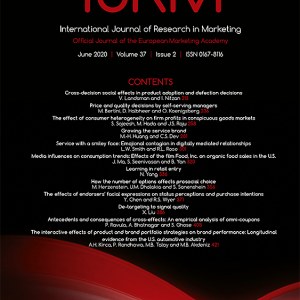
Gelper, S. and Stremersch, S. (2014). Variable selection in international diffusion models International Journal of Research in Marketing, 31(4):356--367.
-
Affiliated author
-
Publication year2014
-
JournalInternational Journal of Research in Marketing
Prior research comes to different conclusions as to what country characteristics drive diffusion patterns. One prime difficulty that may partially explain this divergence between studies is the sparseness of the data, in terms of the periodicity as well as the number of products and countries, in combination with the large number of potentially influential country characteristics. In face of such sparse data, scholars have used nested models, bivariate models and factor models to explore the role of country covariates. This paper uses Bayesian Lasso and Bayesian Elastic Net variable selection procedures as powerful approaches to identify the most important drivers of differences in Bass diffusion parameters across countries. We find that socio-economic and demographic country covariates (most pronouncedly so, economic wealth and education) have the strongest effect on all diffusion metrics we study. Our findings are a call for marketing scientists to devote greater attention to country covariate selection in international diffusion models, as well as to variable selection in marketing models at large.